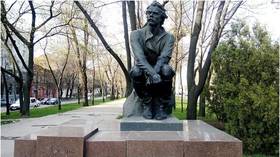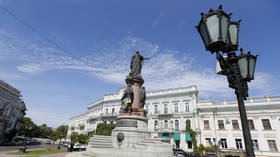Ukraine dismantles monument to iconic Soviet author

Ukrainian authorities have taken down a monument to Maxim Gorky, a revolutionary who founded socialist realism and became one of the most popular Soviet writers, in the eastern city of Dnepr. The move comes amid the “de-Russification” campaign ongoing across the country.
A crane lifted the statue from its pedestal and loaded it into a dump truck on Monday. City officials slated eight monuments “linked to the history and culture of Russia and the USSR” for removal earlier this month. The Gorky statue in Dnepr was vandalized in 2017 and 2021.
Mayor Boris Filatov said all monuments that are removed will be temporarily stored on the premises of the city’s animal control service. The Gorky statue is the work of the Dnepr-born sculptor Nikolay Krasotin and was unveiled in 1977.
Gorky is considered the founder of Soviet literature. He pioneered the socialist realism genre, the writing style and aesthetics of which were designed to serve the purpose of building a socialist state.
The writer was arrested for participating in the 1905 Russian revolution, but was quickly released, partly thanks to protests from abroad. He then left to live abroad to avoid another arrest, but chose to return after the 1917 Bolshevik revolution, becoming one of the most renown writers of the Soviet Union.
He is best known for many plays, such as ‘The Lower Depths’ and ‘Summerfolk’, as well as an autobiography titled ‘My Childhood’.
Gorky died in 1936 while working on the novel ‘The Life of Klim Samgin’, which is set in late Imperial Russia and during the revolution. Gorky was friends with Vladimir Lenin, and has sometimes been described as Joseph Stalin’s favorite writer.
In 2015, Ukraine adopted a law designed to “de-Communize” the country, which called for the removal of street names and monuments tied to the Soviet era. While officials argued that the process would help Kiev break from its Communist past, the campaign also targeted landmarks with wider links to Russia.
After Moscow launched its military operation in the neighboring state in late February, officials across Ukraine began increasingly taking down monuments associated with the time when the country was part of the Russian Empire. They dismantled not only statues and busts of monarchs and generals, but also monuments to writers and scientists, including poet and author Alexander Pushkin, who lived in the early 19th century.
In June, the Ukrainian Culture Ministry created a council tasked with coordinating “the issues of de-Russification, de-Communization and decolonization.” Culture Minister Aleksandr Tkachenko called this month for the “boycotting of Russian culture” across the globe, urging opera houses to stop playing music written by Pyotr Tchaikovsky and other Russian composers.
Moscow has repeatedly criticized the Ukrainian authorities for what it considers “forced Ukrainization and de-Russification” aimed at suppressing the rights of about a quarter of the country’s population.













